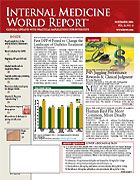Publication
Article
Herbal Supplements and Anesthesia Don't Mix
Author(s):
Verify That Patients Discontinue Use Before Surgery
Evaluation of patients scheduled for elective surgery should include close questioning about their use of herbal supplements, in addition to their medical history and prescription medication use, researchers recommend (Anesthesiology. 2006; 105:454-461).
Results of a new study showed an increased risk of adverse events in the preoperative period for patients taking traditional Chinese herbal medications (TCHM) prescribed by a traditional Chinese medication practitioner, compared with patients taking over-the-counter (OTC) herbal medications.
This study included 601 patients who, before undergoing major elective surgery, were asked about their use of Western medicine and TCHM in the 2 weeks before surgery.
Of the participants, 483 (80%) took self-prescribed Chinese herbal medications and 47 (8%) took these by prescription (with or without self-prescribed herbals) in the 2 weeks leading up to surgery. The rough incidences of any of the combined end points of preoperative, intraoperative, and postoperative events were 23%, 74%, and 63%, respectively. Compared with those who did not take herbal supplements, patients who took herbal products by prescription were more likely to have a preoperative event (adjusted relative risk, 2.21).
Users of herbal products by prescription were also found to be more than twice as likely to have decreased potassium levels and/or impaired clotting than nonusers in the preoperative period.
The duration of anesthesia was also longer for users of prescribed herbal agents than for users of OTC herbal medications. A main drawback to the findings is that the study evaluated traditional Chinese medications that contain complex mixtures of a variety of herbs. Without standardization, it is difficult to identify the exact quantities of herbs that the patients were actually receiving.
Lead investigator Anna Lee, PhD, MPH, of the Department of Anaesthesia and Intensive Care, the Chinese University of Hong Kong, Prince of Wales Hospital, Shatin, Hong Kong, and colleagues write, “The use of TCHM by prescription near the time of surgery should be discouraged because of the increased risk of adverse events in the preoperative period.”
Commenting on the study in an editorial in the same issue (pages 441-442), Jonathan Moss, MD, PhD, and Chun-Su Yuan, MD, PhD, both of the Department of Anesthesia and Critical Care, The University of Chicago Hospitals, Illinois, note that although it is encouraging that the results did not indicate specific major outcome changes for patients taking OTC herbal supplements, patients and physicians need to be aware that adverse events caused by herbs could occur before, during, and after surgery.
“Despite the reassurances of this study, it seems prudent to recommend discontinuation of most herbals before surgery. However, given the reality of modern practice, in which many patients are not seen until shortly before or on the day of surgery, the results of this study are encouraging to patients and physicians,” Drs Moss and Yuan write.






